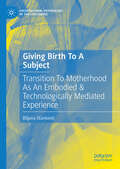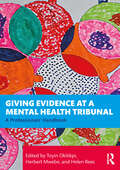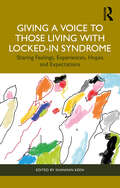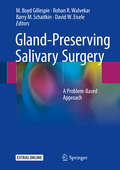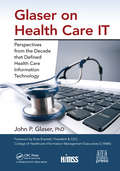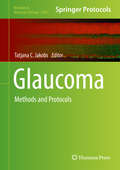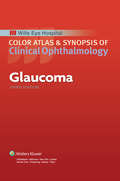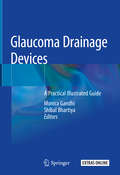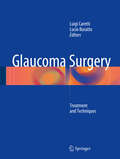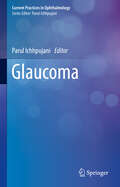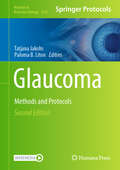- Table View
- List View
Give the Gift of Healing: A Concise Guide to Spiritual Healing
by Rosemary AlteaFrom The New York Times bestselling author of The Eagle and the Rose and Proud Spirit comes a book on spiritual healing.Rosemary Altea, the internationally renowned medium known to millions worldwide as "The Voice of the Spirit World," is also the founder of the Rosemary Altea Association of Healers, a charitable organization with patients worldwide. In this book package, Rosemary offers an introduction to spiritual healing, beginning with a personal account of how she embraced her role as a healer sixteen years ago. Sharing her belief that sickness and pain can cause the soul to live in a dark place, Rosemary presents healing techniques designed to give light - the Seven Steps to Self-Healing. We meet two inspiring patients who have been treated by Rosemary and her team of healers, and we learn how we can harness the power of our own thoughts and use color energy visualizations to achieve inner peace. Also included is a color chart explaining how each of eight vibrant hues can give us the gift of healing.
Giving Birth To A Subject: Transition To Motherhood As An Embodied & Technologically Mediated Experience (Sociocultural Psychology of the Lifecourse)
by Biljana StankovićThis book analyses how women navigate their personal worlds during a life stage of intense changes and ruptures, within a complex and rapidly changing sociocultural context of a post-socialist society. The transition to first-time motherhood is considered a unique phase in adult development, bringing about an abundance of profound psychosocial and bodily changes. This book-length study examines these changes from a first-person perspective, with particular attention to dimensions of personal experience and functioning that are usually neglected in psychological (and even sociocultural) scholarship – embodiment and techno-material mediatedness. To account for the complex and contextualised phenomenon, the author outlines a theoretical framework that connects sociocultural psychology with phenomenology and science and technology studies. This pluralistic and interdisciplinary approach promises to move forward the way we think not only about women’s experiences, pregnant and birthing bodies, and medical practices, but also the way we think about subjects, their embodied condition of existence, and their entanglements with socio-material aspects of culture.
Giving Blood: The Institutional Making of Altruism
by Johanne Charbonneau André SmithGiving Blood represents a new agenda for blood donation research. It explores the diverse historical and contemporary undercurrents that influence how blood donation takes place, and the social meanings that people attribute to the act of giving blood. Drawing from empirical studies conducted in the United States, Canada, France, Australia, China, India, Latin America and Africa, the book’s chapters turn our attention to the evolution of blood donation worldwide, examining: the impact of technology advances on blood collection practices the shifting approaches to donor recruitment and retention the governance and policy issues associated with the establishment of blood clinics the political and legal challenges of regulating blood systems. This innovative examination moves the focus from individual explanations of rates of blood donation to a social, structural explanation. It will appeal to international scholars and students working in the areas of sociology, medical anthropology, health care, public policy, socio-legal studies, comparative politics, organizational management, health and illness, the history of medicine, and public health ethics.
Giving Evidence at a Mental Health Tribunal: A Professionals’ Handbook
by Helen Rees Herbert Mwebe Okitikpi, Edited by ToyinThis practical and accessibly written guide introduces what practitioners need to know about Mental Health Tribunals, covering the status of the tribunal, its processes, and the evidence that is required from witnesses. Members of the multidisciplinary team in mental healthcare may have a legal duty to provide oral and written evidence at First-Tier Tribunals (mental health). The tribunal acts as a key safeguard in the provision of mental health care under the Mental Health Act 1983 (as amended 2007) and it is important that all clinicians contributing evidence understand their role and responsibilities. Helping readers to understand what is required of them as witnesses, and to appreciate the extent of the tribunal’s powers, this book provides invaluable information about expected best practice and relevant skills, such as distinguishing between an informed opinion and conjecture.This text is an essential reference for mental health practitioners and students from a range of professions, including nursing, social work, law, occupational therapy, medicine, and psychology.
Giving Voice to Values as a Professional Physician: An Introduction to Medical Ethics (Giving Voice to Values)
by Ira BedzowGiving Voice to Values as a Professional Physician provides students with the theoretical background and practical applications for acting on their values in situations of ethical conflict. It is the first medical ethics book that utilizes the Giving Voice to Values methodology to instruct students in medical ethics and professionalism. In doing so, it shifts the focus of ethics education from intellectually examining ethical theories and conflicts to emphasizing moral action. Each section of the book explains how moral decision-making and action can be implemented in the healthcare arena. Medical ethics cases are provided throughout in order to assist students in giving voice to their values and developing skills for professional action. The Giving Voice to Values methodology, and the cases in this book, do not focus on the big questions of academic ethics, but rather on the ethics of the everyday, even if the challenges presented are difficult. In other words, the ethical questions students will have to face, in this book and in medical education and practice, are about how to interact with others, whether they be patients or colleagues, who might have different ethical positions. The book provides a unique guide for professional identity formation and the teaching of ethics in medical schools.
Giving a Voice to those Living with Locked-In Syndrome: Sharing Feelings, Experiences, Hopes and Expectations
by Shannan KeenGiving a Voice to those Living with Locked-In Syndrome is a unique book that provides a way for the life experiences of people living with Locked-In Syndrome (LiS) to be heard. It combines the personal experiences of those living locked-in, with the biomedical aspects of LiS, including how it is diagnosed and treated, and the technology, such as eye-tracking devices and brain/computer interfaces, enabling those living with LiS to communicate.By highlighting both the positive and the negative elements of living with LiS, the book aims to encourage change, wherever it is needed in the field of LiS, to guide future diagnostic techniques and enable better, compassionate and appropriate care. Most importantly the book focuses on the moving autobiographies of people living locked-in. These personal accounts show their lives before becoming locked-in; their experiences during the illness or accident that resulted in LiS; how they came to terms mentally, emotionally and physically with their complete change in lifestyle; how those around them, their partners, family, friends and colleagues, adjusted; what is helpful to them and what is frustrating; and finally, their hopes for the future. Autobiographies are drawn from authors all over the globe, allowing readers insights into how LiS is dealt with in different countries, in terms of treatment, care and funding.It is valuable reading for all professionals working in the brain injury field, including neuropsychologists and those in the caring professions, as well as students in these fields. It will also be relevant for IT students and those working with new technologies.All royalty payments for this book are going to Mind Care International Foundation, a charity that provides information and support to patients and their families after brain injury.
Gland-Preserving Salivary Surgery: A Problem-Based Approach
by M. Boyd Gillespie Rohan R. Walvekar Barry M. Schaitkin David W. EiseleSalivary Endoscopy is a rapidly emerging field that has revolutionized the management of non-neoplastic diseases of the salivary gland, such as salivary stones, sialadenitis, and salivary duct stenosis. With the emergence of endoscopic access to the salivary ductal system, several procedural and technical innovations have emerged that have now permitted gland preservation surgery for these pathologies. As more centers and physicians are adopting this rapidly emerging and evolving procedure, there is a need for source of literature that provides current concepts and detailed technical descriptions of the procedures that involve gland preservation surgery. This text intends to capture the current concepts among experts and in literature regarding the management of non-neoplastic salivary gland diseases. The book also focuses on steps of surgical management and technical pearls while providing detailed information on the decision-making process when emcompassing the diversity of clinical presentation, intra-operative decision-making and post op care. Gland Preservation Surgery provides high quality illustrations, clinical and operative images, and videos that serve as an online resource to salivary gland surgeons and endoscopists with varying experience and expertise.
Glandular Lesions of the Uterine Cervix
by Rosemary H. Tambouret David C. WilburThis volume provides a compact, concise and up-to-date resource for pathologists and clinicians who are involved in women's health. The book summarizes the incidence, epidemiology and risk factors for cervical adenocarcinoma, while reviewing the normal histology of the cervix and glandular lesions of the cervix. The cytological appearance of glandular lesions of the cervix and their mimics is amply illustrated and discussed. Management of glandular lesions is also outlined. Written by authorities in the field, Glandular Lesions of the Uterine Cervix: Cytopathology with Histologic Correlates is of great value to cytopathologists, surgical pathologists, gynecologic oncologists and surgeons.
Glaser on Health Care IT: Perspectives from the Decade that Defined Health Care Information Technology (HIMSS Book Series)
by John P. GlaserJohn Glaser has been an astute observer and recognized leader in the health care industry for over thirty years. He has written a regular column for Hospitals & Health Networks in which he comments on a wide range of topics, including improving organizational performance through health information technology (HIT), changes in HIT architecture, challenges in leveraging data, and the evolution of the role of IT leadership. Glaser on Health Care IT: Perspectives from the Decade that Defined Health Care Information Technology is a collection of some of the most widely read articles that have been published in H&HN Daily, H&HN Weekly, and Most Wired Online in the past decade (2005–2015). The columns are dated to show their original publication dates, and the material is organized into four broad themes: HIT Applications and Analytics Challenges Improving Organizational Performance through HIT IT Management Challenges HIT Industry Observations Each section offers readers an intimate look at the myriad issues associated with getting IT "right" and the organizational performance gains that can be achieved in doing so. Moreover, the book examines the power and potential of the technologies available to health care providers today, as well as the transformative nature of those we have yet to fully embrace.From seasoned CIOs and consultants to software developers and nurses, this book provides invaluable insights and guidance to all those seeking to make the delivery of care safer, more effective, and more efficient through the application of health care IT.Foreword by Russ Branzell, President and CEO, College of Healthcare Information Management Executives (CHIME) Co-published with Health Forum, Inc.
Glass-Ionomers in Dentistry
by Sharan K. SidhuThis concise handbook covers all aspects of glass-ionomer cements, from the development of these materials in the early 1970s through to the current state of the art. Their physical, chemical, biological, and clinical properties are described as well as how their formulation and usage have evolved over time, giving rise to newer subcategories of the parent materials. Detailed coverage is provided on the clinical use of glass-ionomer cements in restorative and pediatric dentistry and in widely taught and practiced newer approaches, including atraumatic restorative treatment and minimal intervention dentistry. The authors are internationally acclaimed experts who present information in an easy-to-follow format that will appeal to readers. With the renewed worldwide quest for substitute materials for the more traditional amalgam, glass-ionomer cements have the potential for further development and may play a significant role in future trends.
Glaucoma
by Graham E. TropePrimary or chronic open angle glaucoma is a painless condition usually associated with high pressure in the eye. It affects approximately four per cent of all people over the age of fifty. Untreated, glaucoma is a major cause of blindness worldwide.Glaucoma: A Patient's Guide to the Disease offers essential information about glaucoma and its treatment, presented in a simple question and answer format to allow patients to participate actively in the decision-making process along the road to successful maintenance of their vision. The fourth edition has been updated with the latest medical and surgical advancements in diagnosing and treating the disease, including information on new imaging techniques. Graham E. Trope provides the answers to dozens of commonly asked questions in sections headed 'All About Glaucoma,' 'Tests for Glaucoma,' and 'All About Treatment.' Also included are discussions of possible complications, detailed illustrations, and a listing of glaucoma societies in Canada, the United States, and United Kingdom. This valuable guide is an essential reference not only for patients but for all health-care professionals, including general practitioners and optometrists.
Glaucoma
by Tatjana C. JakobsThis detailed volume introduces the reader to current methods in glaucoma research, in particular those that make use of animal disease models. Given that the retinal ganglion cells damaged and destroyed by glaucoma do not regenerate after lowering the intraocular pressure, new therapeutic approaches that protect ganglion cells directly is a vital research goal that this volume's contents aim to aid scientists in developing. Written in the highly successful Methods in Molecular Biology series format, chapters include introductions to their respective topics, lists of the necessary materials and reagents, step-by-step, readily reproducible laboratory protocols, and tips on troubleshooting and avoiding known pitfalls. Authoritative and practical, Glaucoma: Methods and Protocols serves as a useful guide for both ophthalmologists in clinical practice and researchers in the field.
Glaucoma (Color Atlas and Synopsis of Clinical Ophthalmology)
by Douglas RheePublisher's Note: Products purchased from 3rd Party sellers are not guaranteed by the Publisher for quality, authenticity, or access to any online entitlements included with the product. Developed at Philadelphia’s world-renowned Wills Eye Hospital, the Color Atlas and Synopsis of Clinical Ophthalmology series covers the most clinically relevant aspects of ophthalmologic medicine in a highly visual, easy-to-use format. Vibrant, full-color photos and a consistent outline structure present a succinct, high-yield approach to the seven topics covered by this popular series: Cornea, Retina, Glaucoma, Oculoplastics, Neuro-Ophthalmology, Pediatrics, and Uveitis. This in-depth, focused approach makes each volume an excellent companion to the larger Wills Eye Manual as well as a practical stand-alone reference for students, residents, and practitioners in every area of ophthalmology.
Glaucoma Drainage Devices: A Practical Illustrated Guide
by Monica Gandhi Shibal BhartiyaThis book offers a comprehensive guide to the use of glaucoma drainage devices (GDDs) in various clinical settings, and covers aspects ranging from the basics to managing complications. The aim of this work is to provide readers with a practical go-to desktop book to assist in and enhance their surgical competence with glaucoma drainage devices. Starting with the history of GDDs, it addresses various devices, their models and modifications, and highlights their advantages and disadvantages through numerous illustrations. The indications for the drainage devices are discussed in detail, using patient cases with photographs. The book describes the techniques for all devices in detail, which are explained further in accompanyin videos. After covering the basic techniques, the book provides extensive notes on modifications that may be required in various case presentations such as congenital glaucoma, post-penetrating keratoplasty with extensive peripheral synechiae, and procedure through pars plans etc. Complications and their management are subsequently addressed. The book is an essential guide to help surgeons match patients to the most suitable device, and to support patients from preparation through post-operative care. Primarily intended for glaucoma surgeons, it offers a valuable resource for fellows in training, and all who have an interest in glaucoma surgery.
Glaucoma Imaging
by Antonio FerrerasThis atlas offers a truly comprehensive update on the use of imaging technologies for the diagnosis and follow-up of glaucoma. In addition to standard automated perimetry, gonioscopy, fundus photography, and stereophotography, other advanced, high-resolution methods for imaging the eye in glaucoma are explained in detail, including ultrasound biomicroscopy, confocal scanning laser ophthalmoscopy, scanning laser polarimetry, and spectral domain optical coherence tomography. The role of the various tests and the keys to optimizing their use in clinical practice are detailed with the aid of high-quality figures in order to enable the reader to achieve the best possible performance when applying these tools. The risk of developing visual disability and blindness as a consequence of glaucoma varies widely among affected individuals. Personalized testing strategies and tailored therapeutic interventions are required to effectively reduce visual impairment due to glaucoma. Glaucoma Imaging will assist residents, researchers, and clinicians in improving their ability to understand and integrate the information obtained using traditional techniques with the reports provided by computer-assisted image instruments.
Glaucoma Surgery
by Luigi Caretti Lucio BurattoThis book illustrates effective surgical techniques for treating glaucoma in a practical and easy to follow format. Within the various chapters the different steps for all surgical procedures are clearly described to guide the reader through each clinical presentation. There are many drawings with detailed explanations regarding incisional surgical techniques such as trabeculectomy, shunts and non perforating techniques, canaloplasty and modern Microinvasive Glaucoma Surgeries (MIGSs). Surgical anatomy, different anesthetic techniques, medical therapy, laser treatments and choice of treatment to contrast glaucoma are also explained throughout the book. Finally there are three chapters on the most modern and effective surgical procedures, drawn up by leading internationally renowned ophthalmologists. This book will be an essential clinical resource for a wide range of readers including ophthalmologists in training, experienced surgeons and glaucoma specialists.
Glaucoma: A Guide from Dr. Harry Quigley
by Harry QuigleyIf you or a member of your family has been told that you have glaucoma, or, if you have glaucoma and want to be sure that the treatment you're receiving is right for you, this patient-oriented guide was designed to answer the many questions you may have. The guide gives authoritative answers, easily understood explanations, helpful suggestions, and life-style advice. It won't matter if you are not a medical specialist, since it is written in plain English. Most glaucoma patients retain good vision and live a normal life. The solutions given can take the stress out of dealing with glaucoma and should maximize the chance that no further injury to your ability to see will occur. There is good evidence that patients who try to learn more about their medical care do better in the long run. The author is Dr. Harry A. Quigley, Director of the Glaucoma Center of Excellence of the Wilmer Ophthalmological Institute, Johns Hopkins School of Medicine. He has 40 years' experience caring for glaucoma, researching its treatments, and has performed 10,000 medical and surgical procedures for this disease. His 350 published papers on glaucoma represent the work that is most quoted by other eye doctors in the last 30 years. He was the Editor-in-Chief of the premier vision research journal, Investigative Ophthalmology and Visual Science. No other living ophthalmologist has received the Friedenwald Award (ARVO), the Doyne Medal (Oxford Ophthalmological Congress), the Jackson Lectureship (AAO), and the American Glaucoma Society Lectureship. The guide has quick "Take Home" summaries at the start of each section with the most important information. For those wishing to know much more, detailed explanations, drawings and photographs follow. The sections are designed to answer the questions that patients ask, as well as the questions that they should have asked. For those who know little about their glaucoma, it begins with a simple introduction to the disease. However, those who want in depth information will find discussions of how the disease is diagnosed, what the treatment options are, and how to live a normal life with glaucoma. There are not perfect answers to every question about glaucoma. Where there is controversy, the different sides of the issue are presented to help you and your doctor to make the better choice. There is consideration given to alternative approaches to therapy. There is no cure for glaucoma, and we cannot yet restore vision once it is lost. The guide presents ways to continue life at a high level, whatever the stage of glaucoma.
Glaucoma: Basic And Clinical Perspectives (Current Practices in Ophthalmology)
by Parul IchhpujaniThis book covers all the latest aspects of what’s happening in all the micro-fields of glaucoma. The chapters cover pathogenesis, structural and functional tests, and medical, laser and surgical therapies. An entire chapter is devoted to the future of glaucoma management. All the chapters are supported with illustrations to enhance understanding of the developments.A lot of innovations are happening in the field of basic research, pharmacology, surgical devices and imaging equipment for glaucoma.As part of the series “Current Practices in Ophthalmology” this volume is meant for residents, fellows-in-training, generalist ophthalmologists and specialists alike.
Glaucoma: Methods and Protocols (Methods in Molecular Biology #2858)
by Tatjana Jakobs Paloma B. LitonThis second edition volume expands on the previous edition with an update on the latest methodologies used to study the neurodegeneration of glaucoma. This book notably features a focus on ocular hypertension as an important factor in the pathogenesis of glaucoma, and the relationship between elevated intraocular pressure and neurodegeneration. Written in the highly successful Methods in Molecular Biology series format, chapters include introductions to their respective topics, lists of the necessary materials and reagents, step-by-step, readily reproducible laboratory protocols, and tips on troubleshooting and avoiding known pitfalls. Cutting-edge and authoritative, Glaucoma: Methods and Protocols, Second Edition is a valuable resource for anyone interested in glaucoma research. This book will encourage innovation and facilitate progress toward improving our understanding and treatment of glaucoma.
Glenohumeral Osteoarthritis in the Young Patient: Evaluation and Management
by Joseph A. Abboud Brian M. Grawe J. Gabriel HorneffThe management of glenohumeral arthritis in the young patient remains a challenging problem for the treating clinician. The activity demands seen in such patient populations require a unique understanding of what the goals of treatment are to ensure satisfied and sustainable outcomes. In addition, younger patients have a longer life expectancy and more active lifestyles, which can negatively impact the longevity of arthroplasty implants that are traditionally used in the older patient population. As such, the discovery and implementation of novel and anatomy preserving techniques continue to evolve to meet the demand of younger patients without compromising their outcomes. This practical text serves to educate the treating clinician on how to recognize and categorize glenohumeral osteoarthritis in young patients and offers insight into the various operative and non-operative treatment options. Opening chapters examine the prevalence and burden, etiology and evaluation of the condition, followed by chapters discussing the current non-invasive and non-operative approaches to treatment, such as injection therapy. The main complement of chapters are detailed descriptions of surgical approaches, from arthroscopy and cartilage reconstruction to total and reverse shoulder arthroplasty, stemless approaches and arthrodesis. A final chapter expands on future management strategies. Radiographs and intraoperative photos are provided to enhance the text.Presenting the state of the art for this increasingly common condition, Glenohumeral Osteoarthritis in the Young Patient is an ideal resource for orthopedic surgeons and sports medicine specialists alike.
Glial Cell Engineering in Neural Regeneration
by Li YaoThis book focuses on current applications of glial cells in neural regeneration, especially in spinal cord repair. It introduces the application of a few types of glial cells including oligodendrocyte, astrocyte, Schwann cells, and stem cell derived glial cells in neural regeneration. The latest glial cell research with biomaterials, gene modification, and electrical signals is also summarized. This is an ideal book for undergraduate and research students in tissue engineering, neurobiology, and regenerative medicine as well as researchers in the field.
Glial Cells in Health and Disease of the CNS
by Rommy Von BernhardiA timely overview covering the three major types of glial cells in the central nervous system - astrocytes, microglia, and oligodendrocytes. New findings on glia biology are overturning a century of conventional thinking about how the brain operates and are expanding our knowledge about information processing in the brain. The book will present recent research findings on the role of glial cells in both healthy function and disease. It will comprehensively cover a broad spectrum of topics while remaining compact in size.
Glial Engineering and Glial Interfaces: Targeting the Role of Astrocytes and Other Glial Cells in Brain Function and Dysfunctions
by Valentina Benfenati Luca MaioloThis book focuses on the most recent tools unveiling the role of glial cells in brain function and dysfunction, especially involving epilepsy, ischemia, and glioma. It introduces this emerging field, herein called Glial Engineering, dealing with the development and application of technologies targeting glial cells, with a special focus on astrocytes. The latest glial cell research with biomaterials, gene modification, bioelectronic devices, and computational methods is highlighted. This is an ideal book for undergraduate and research students in tissue engineering, biomedical engineering, neural engineering, chemistry, biomaterials science, and regenerative medicine as well as researchers in the field of biophysics, neurophysiology, and neuroscience.
Glial Physiology and Pathophysiology
by Alexei Verkhratsky Arthur Morgan ButtGlial Physiology and Pathophysiology provides a comprehensive, advanced text on the biology and pathology of glial cells.Coverae includes:the morphology and interrelationships between glial cells and neurones in different parts of the nervous systemsthe cellular physiology of the different kinds of glial cellsthe mechanisms of intra- and inter-cellular signalling in glial networksthe mechanisms of glial-neuronal communicationsthe role of glial cells in synaptic plasticity, neuronal survival and development of nervous systemthe cellular and molecular mechanisms of metabolic neuronal-glial interactionsthe role of glia in nervous system pathology, including pathology of glial cells and associated diseases - for example, multiple sclerosis, Alzheimer's, Alexander disease and Parkinson'sNeuroglia oversee the birth and development of neurones, the establishment of interneuronal connections (the 'connectome'), the maintenance and removal of these inter-neuronal connections, writing of the nervous system components, adult neurogenesis, the energetics of nervous tissue, metabolism of neurotransmitters, regulation of ion composition of the interstitial space and many, many more homeostatic functions. This book primes the reader towards the notion that nervous tissue is not divided into more important and less important cells. The nervous tissue functions because of the coherent and concerted action of many different cell types, each contributing to an ultimate output. This reaches its zenith in humans, with the creation of thoughts, underlying acquisition of knowledge, its analysis and synthesis, and contemplating the Universe and our place in it.An up-to-date and fully referenced text on the most numerous cells in the human brainDetailed coverage of the morphology and interrelationships between glial cells and neurones in different parts of the nervous systemDescribes the role og glial cells in neuropathologyFocus boxes highlight key points and summarise important factsCompanion website with downloadable figures and slides
Glial-Neuronal Signaling in Neuroendocrine Systems (Masterclass in Neuroendocrinology #11)
by Jeffrey G. Tasker Jaideep S. Bains Julie A. ChowenThis volume discusses current research on glial-neuronal interactions in several neuroendocrine systems. Glial-neuronal bidirectional transmission represents one of the fastest-growing areas of investigation in neuroscience today. Unraveling the interactions and signaling synergy between glial cells and neurons is critical to advancing our understanding of brain function. Consequently, this book summarizes the latest findings on the roles of astrocytes, microglia and tanycytes in the control of synaptic transmission, synaptic plasticity, blood-brain signaling, neuroinflammation and immune signaling. In addition, leading experts in the field discuss how reproductive function, the stress response and energy homeostasis are regulated by glial-neuronal communication. Given its scope, the book is essential reading for undergraduate and graduate students in the neurosciences, as well as postdoctoral fellows and established researchers who are looking for a comprehensive overview of glial-neuronal crosstalk in neuroendocrine systems. This is the eleventh volume in the International Neuroendocrine Federation (INF) Masterclass in Neuroendocrinology series (Volumes 1-7 published by Wiley), which aims to illustrate the highest standards and highlight the latest technologies in basic and clinical research, and aspires to provide inspiration for further exploration into the exciting field of neuroendocrinology.

